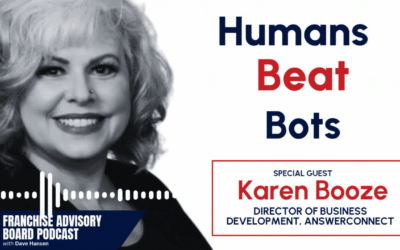Kicking Off the Conversation
One of my favorite parts about hosting The Advisory Board Podcast is connecting with leaders who’ve been in the trenches — running franchises, building brands, and solving real-world problems.
In this episode, I sat down with my friend Christian Pillat, founder and CEO of Transitiv, the franchise industry’s go-to solution for collaborative intelligence. Christian’s not only built technology platforms for franchising — he’s also been a multi-unit franchise owner and operator.
We dug into a critical question: How will data make or break your franchise? If you’ve ever struggled to coach franchisees effectively, build trust across the network, or identify problems before they hit your P&L, this conversation is for you.
🎥 Watch the episode on YouTube
Why Anecdotal Coaching Fails
Christian points out that most franchise coaching today is subjective and anecdotal. A coach might talk to one top-performing franchisee, hear what’s working for them, and then share that same advice across the network — without knowing if it applies elsewhere.
The problem? Anecdotes aren’t scalable, and they often miss the real performance drivers. Data, on the other hand, illuminates blind spots and pinpoints exactly where a franchisee is falling behind.
As Christian put it:
“It’s a lot easier to improve something you’re bad at than something you’re already great at. Data tells you where to focus.”
The Power of Leading Indicators
Most brands still rely on lagging indicators — like monthly P&Ls — which can be 45 days too late. By the time the numbers arrive, it’s often too late to fix the problem.
Christian’s team at Transitiv focuses on leading indicators like:
- Website sessions and traffic trends
- Lead conversion rates
- Customer review sentiment
One client spotted a 50% drop in website traffic just days after switching vendors. With that insight, they corrected the issue and recovered revenue before the month closed.
Transparency Builds Trust
Franchisees often trust peer advice more than corporate coaching. That’s why peer benchmarking is so powerful.
When operators can see how they compare to similar franchisees — whether by region, business stage, or product mix — they’re more open to making changes. Christian shared a story of a brand where operators with lower prices increased them after seeing the network’s average, resulting in a 15% revenue boost.
The Three Metrics That Matter Most
Christian recommends brands focus on just three top-level metrics:
- Website Sessions → Sales
- Sales → Review Volume
- Review Sentiment
These create a clear line from visibility to revenue to customer satisfaction — without drowning teams in dozens of KPIs.
Dave’s Takeaways
From our conversation, here’s what every franchise leader should remember:
- Ditch anecdotal coaching. Data gives you context, not just opinions.
- Track leading indicators. Act before the P&L tells you there’s a problem.
- Use peer benchmarking. Transparency strengthens the network.
- Focus on the big three metrics. Don’t let dashboards get bloated.
If you want your franchise to operate proactively, not reactively, the shift starts with accessible, shared, and trusted data.
Connect with the Guest:
Watch or Listen:




